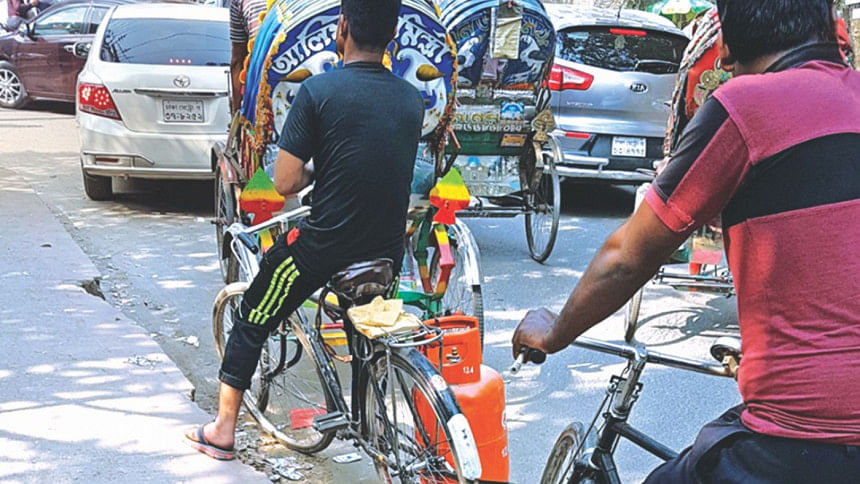We choose to be unsafe

The chain reaction, which culminated into the Chawkbazar devastation last Wednesday, was reportedly detonated by a car's gas cylinder that burst, leading to the explosion of plastic goods and chemicals stored in an area of mixed occupancies.
Bangladesh National Building Code 2006, now in force, does not allow Residential Buildings (Occupancy A) and Hazardous Buildings (Occupancy J) to be located in the same building or premises. Even in latter proposals, BNBC 2015 forbids residences (Fire Index 1) to be located in the same building with hazardous businesses (Fire Index 4) without code-specified separation and detachment. That did not happen in Chawkbazar. It is not happening either in other areas within this city or in the country. The enforcement of index-based zoning will be a huge positive change in making our cities safer, and liveable.
Engaged in threatening occupations, abetted by wheeling and dealing compliance enforcer, they end up violating such lifesaving legal requirements. Profit-motivated businesspeople choose their present location despite the congestion for convenience, logistics, and neighbourly tolerance. Hundreds of lives should be enough to dissuade the foolhardy merchants and their corrupt government accomplices, one would think.
The excessive Fire Load of the dwellings, thoughtlessly packed with highly flammable chemicals that have calorific value several times higher than wood, for example, require fire resistance of at least four hours. The lack of integrity of the building elements, typical in a residential building, was not enough to protect the area and the residents even for a few minutes. Lack of any fire protection plan or equipment epitomises their apathy.
Ignited chemical vapour, especially paint thinners (perhaps Methyl Ethyl Ketone) will form explosive mixtures with air. The ensuing fire needed extinguishing with dry chemical powder, foam, and carbon dioxide. The Fire Service, despite the narrow streets as well as overcrowding, managed with difficulty to transport foam tender and relevant firefighting vehicles to the site to limit the fire. Water was effective in cooling the peripheral surfaces, but the stored chemicals had to burn out completely to avoid a catastrophe. Chemical and plastics business concerns are not prepared for such an eventuality with even mandatory buckets of sand and fire extinguishers.
On another front, considering the explosive nature of domestic gas cylinders, traders are not being careful with the containers. This writer has seen such cylinders precariously dangling from bicycles and bouncing on rickshaw vans on busy streets of the capital Dhaka, providing home delivery. The situation maybe as perilous in Chattogram, Khulna and other places, where residents are dependent on gas cylinder.
Jammed with vehicles and pedestrians, children too, one can only imagine a scene littered with charred bodies should the cylinder set off a series of explosions, vehicle to vehicle. Cylinder vendors must go through a rigorous check of technical capacity.
Businesspeople seeking Trade License to deal in hazardous chemicals should have adequate scientific knowledge, relevant training and requisite experience about safe practice. They must employ skilled personnel and have proper storage facilities in designated safe buildings and zones. Such competent persons would not undertake endangered travels, vulnerable storage and risky operation.
Repeating what I said in 2010 following the Nimtoli chemical fire, which killed 124 people, I urge the people of Old Dhaka not to wait for any agency, but to go out there and compel hazardous chemicals and plastics goods dealers to stop immediately their functioning, including dangerous transporting. They can relocate to any area sanctioned by the government, but the status quo cannot persist.
We cannot continue to learn lessons like a poor student hatching his own tragedies. Our pillars of fire failures are many. In the year 2000, a fire at Chowdhury Knitwear & Garments at Narsinghdi BSIC left 54 workers dead and 200 injured. In 2006, a fire at KTS Textile Industries at Kalurghat BSIC in Chattogram claimed 91 lives and injured one hundred. In 2012, a fire swept through Tajreen Fashions at Ashulia, Dhaka, killing 124 and injuring three hundred workers (figures vary in different media). Remediation measures guided by Alliance, Accord and Solidarity with the proactive cooperation of BGMEA and BKMEA, and relevant government departments over the past five years have transformed the garments and knitwear sectors into safe enterprises. That is the only lesson we need to learn now, that sincerity can vastly improve a calamitous circumstance.
We have to design our own success. It is the ripe time to go into severe action by immediately removing the few menacing chemical and plastics-related establishments from residential areas to benefit all, including the perpetrators of the continuing crime against society.
As for us, shall we check our car gas cylinders? Now?
Dr Nizamuddin Ahmed taught Architecture for over three decades and introduced fire studies at BUET Architecture Department in 1988.





Comments